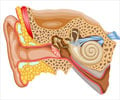
- Age-related hearing loss is a common condition affecting older and elderly adults
- Genes associated with age related hearing loss identified
- Diabetes, blood pressure and use of certain drugs can increase the risk of age related hearing loss
Age related hearing loss is called presbycusis. The diminishing ability to hear properly is acknowledged as a part of growing older and many older adults are faced with difficult and uncomfortable situations where they haven’t been able to hear instructions. This affects their quality of life and can result in
- Inability to hear instructions given by doctors
- Inability to hear traffic noises or cars honking
- Inability to hear announcements at railway stations or at airports
- Inability to hear the doorbell ring.
The loss in hearing could occur due to
1. Changes in the inner and middle ear
2. Changes in the nerve pathways that extend from the ear to the brain.
4.Certain medications could affect the quality of hearing.
Most people do not realize that they suffer from hearing loss as the process is very gradual. The Hearing Handicap Inventory for Adults by Newman et al aids in identifying hearing loss in adults by administering a series of questions. Here are a few of those questions,
Based on the questions from The Hearing Handicap Inventory for Adults [HHIA]: Psychometric adequacy and audiometric correlates by Newman, C.W., Weinstein, B.E., Jacobson, G.P., & Hug, G.A. (1990). Ear Hear, 11, 430-433
1. Are you embarrassed about meeting new people as you cannot hear them well?
2. Is there difficulty in hearing when visiting neighbors, family or even friends?
3. Is there any difficulty in hearing while watching a movie in theatre?
4. Is there difficulty in listening to the radio or TV when it is at a good audible level for the others?
5. Is there frustration while talking to members of the family as you are unable to hear them?
There are many questions in the handbook that help people understand the extent of their hearing loss.
Age related hearing loss can be a difficult condition to get accustomed to, spiraling age related complications. Scientists from the Medical Research Council, Harwell, carried out a study to identify the genes associated with hearing loss.
Genes Associated with Age Related Hearing Loss
Mice with specific mutation were studied for the development of age related conditions. When mice with age related hearing loss was detected, the gene that was mutated in the mice was checked.
The study found that the gene Slc4a10 was mutated in mice with age related hearing loss. This Slc4a10 gene was already associated with age related eye problems; however, this is the first study to find an association between this gene and hearing loss.
The study in mice could pave the way for identifying similar genes in humans that will aid in better understanding of age related hearing loss in humans.
Highlight of the Study
The study finds a conclusive association between gene mutations and age related hearing loss. People with these mutations will be at a higher risk of impaired hearing as their age advances.
"Our study is an important springboard for a better understanding of which genes in humans are involved in age-related conditions, and how changes in those genes influence this. This is a first and vital step in developing new therapies," says Dr. Paul Potter of MRC Harwell.
There are many age related conditions that can affect people as they grow older. Screening for genes associated with age related hearing loss will help in identifying people who are at risk "As we get older, we have an increased risk of developing many conditions, including diabetes, cardiovascular disease, hearing loss and dementia. The genes that we carry can influence this, but it is hard to know which do, or how. This study increases our understanding of the genes related to ageing and ill-health and may ultimately help us to identify new treatments," says Dr. Lindsay Wilson, from the Genetics and Genomics department at MRC.
Supportive Action
People at risk of getting age related hearing loss can
- Get hearing aids that will help them hear better
- Reduce the risk for noise related hearing loss. Listening to very loud music, especially using headphones or inside a car can result in permanent damage to the ear drums, compounding age related hearing loss.
- Get support from friends and family
- Attach amplifiers to phone speakers to be able to hear better.
- Age-Related Hearing Loss - (http://ajcn.nutrition.org/content/early/2016/06/29/ajcn.116.134403.abstract)
- About Age-related hearing loss - (https://medlineplus.gov/ency/article/001045.htm)
- Age-related hearing loss - Presbyacusis - (http://www.hear-it.org/Age-related-hearing-loss)















